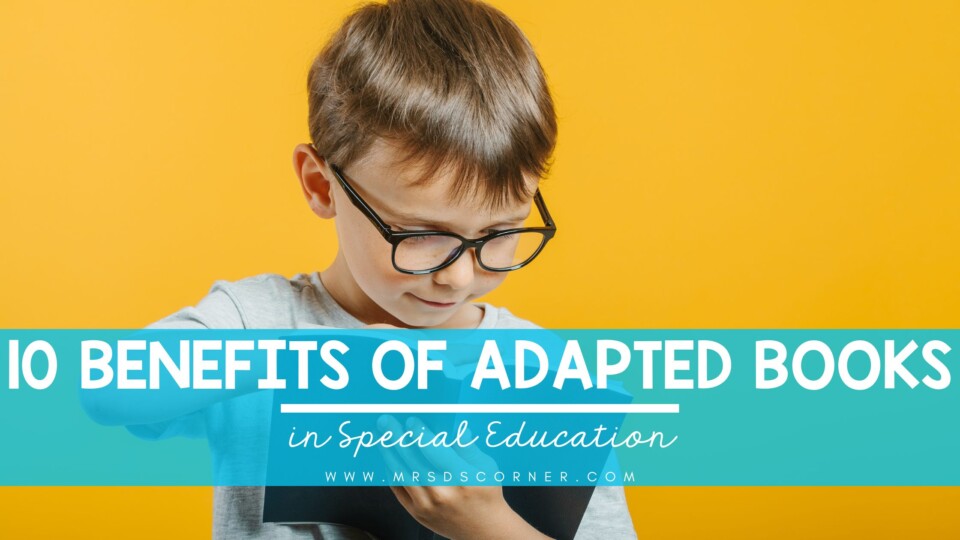Adapted books are specially tailored resources designed to meet the diverse needs of students with varying abilities, particularly in the special education settings. These books often feature simplified language, visual supports, and interactive elements that make them more accessible and engaging for learners. Their accessibility makes them a unique and beneficial addition to the special education classroom.


When I started using them in my classroom I knew that they would be beneficial (or at least I thought they would be!), but I hadn’t really thought about how they would benefit my students. After years of using them and creating hundreds of my own, I realized that the benefits of adapted books go beyond just reading.
Here are ten benefits of using adapted books in special education and why you might want to consider adding them to your classroom like I did.
Enhanced Engagement
The engaging nature of adapted books helps maintain students’ interest and motivation. By incorporating sensory experiences, these books create a more stimulating learning environment, making it easier for students to engage with the content.
Practical Classroom Application: A student with autism might struggle to focus on traditional texts. Adapted books can include colorful illustrations, tactile elements, and interactive components like flaps or textures, which capture their attention and encourage participation.
Improved Comprehension
Simplified language and clear visuals in adapted books help students comprehend information better. This approach reduces cognitive load and allows learners to focus on understanding rather than struggling with difficult text.
Practical Classroom Application: A student with a learning disability may find it challenging to understand complex sentences. An adapted book that breaks down the text into simpler phrases can make it easier for them to grasp the main ideas.
Customized Learning Experiences
Customization allows teachers to address individual learning goals and preferences. When students encounter content that resonates with them, they are more likely to engage deeply and retain information.
Practical Classroom Application: An adapted book can be tailored to reflect a student’s interests, such as dinosaurs or space. By integrating personal preferences, educators can create a more meaningful learning experience.
Development of Literacy Skills
Adapted books provide opportunities for skill development in reading and writing. By focusing on essential literacy skills in a supportive context, students can make significant progress at their own pace.
Practical Classroom Application: A student working on phonemic awareness can benefit from an adapted book that emphasizes specific sound patterns through repetitive phrases or rhymes.
Fostering Independence
Encouraging independence is vital in special education. Adapted books empower students to take charge of their learning by providing tools that enable them to explore texts without constant teacher support.
Practical Classroom Example: Students can use adapted books for independent reading activities, which may include matching pictures to words or following along with a story using visual cues.
Support for Social-Emotional Learning
Social-emotional learning is crucial for all students, especially those with special needs. Using adapted books that target these themes can facilitate discussions about feelings, relationships, and conflict resolution.
Practical Classroom Example: Adapted storybooks that address themes like friendship or emotions can help students relate to social situations and practice empathy.
Collaboration Opportunities
Adapted books encourage collaboration among students, fostering social skills and teamwork. When working together, students can share ideas and strategies, enhancing their understanding of the material.
Practical Classroom Application: Teachers can use adapted books as part of collaborative reading activities, where peers work together to explore the text and support one another’s learning.
Language Development
Language development is essential for all learners. Adapted books provide a rich source of language input in a format that is accessible, allowing students to practice new words and concepts in context.
Practical Classroom Application: An adapted book featuring repetitive sentence structures can help English language learners practice vocabulary and grammar in a low-pressure setting.
Building Confidence
The sense of accomplishment that comes from successfully engaging with adapted books can significantly boost a student’s confidence. This newfound confidence often translates into a willingness to take risks in learning.
Practical Classroom Application: When a student successfully reads an adapted book independently, it boosts their self-esteem and encourages them to tackle more challenging texts in the future.
Facilitating Communication Skills
Communication skills are vital for all students, particularly those with speech or language challenges. Adapted books promote discussion and provide opportunities for students to practice articulating their ideas in a supportive environment.
Practical Classroom Application: Adapted books that include questions at the end encourage students to express their thoughts and opinions about the story.
Get Instant Access to Over 1500 Adapted Books at the Adapted Book Club!
Using adapted books in special education presents numerous benefits that cater to the unique needs of learners. By enhancing engagement, improving comprehension, fostering independence, and supporting language development, these resources play a crucial role in creating an inclusive learning atmosphere. Through thoughtful implementation of adapted books, educators can empower all students to reach their full potential.

